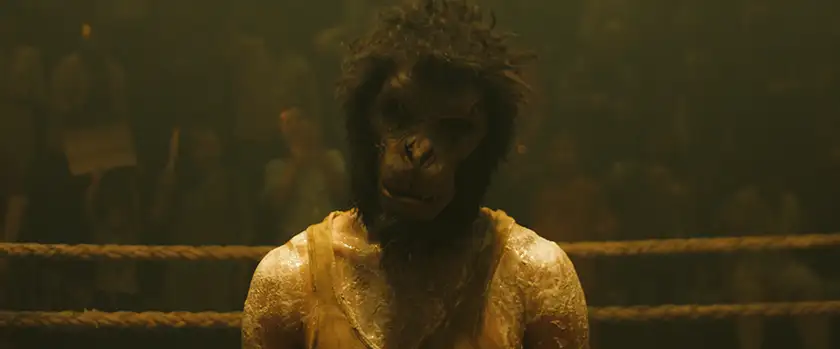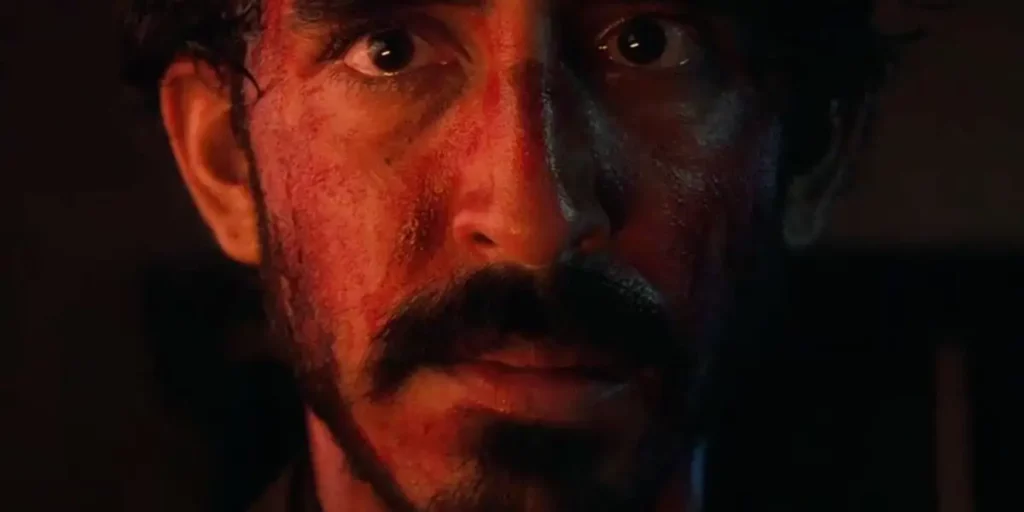Dev Patel’s directorial debut Monkey Man is a brutal brawler of a film, combining influences from Asian action cinema and Indian mythology.
The journey to the big screen of Dev Patel’s directorial debut, Monkey Man, has been a complicated one. Filming was completed in 2021 after a troubled (and COVID-inflicted) production, with Netflix set to release it worldwide. It was therefore a surprise when a trailer confirmed that it had now been taken in by Universal and Jordan Peele through his Monkeypaw Productions company. Now, this revenge action thriller is getting the theatrical release it deserves. Because whilst Patel’s first feature isn’t perfect, it is fairly accomplished. It is also a gritty and physical brawler of a film, combining influences from Asian action cinema and Indian mythology.
In the fictional city of Yatana, a young man credited as ‘Kid’ (Patel) competes in the ring under a monkey mask. He throws the fights for his sleazy promoter (Sharlto Copley), who notes he’d get paid more if he bled. However, Kid is only concentrated on finding the man who murdered his mother (Adithi Kalkunte) and burned down his village when he was a child. His burned hands are a reminder of that dark event – but they also help him get a job at an elite club called Kings, convincing boss Queenie (Ashwini Kalsekar) that he can do the jobs no one else will touch.
After befriending employee Alphonso (Pitobash) and sex worker Sita (Sobhita Dhulipala), Kid works his way up to the top and finds his mother’s killer, chief of police Rana Singh (Sikandar Kher). An assassination attempt leads to a police chase, then a recovery at a temple run by the transgender Alpha (Vipin Sharma). That leads to a confrontation with Rana and his boss, Baba Shakti (Makarand Deshpande), a spiritual guru and ambassador for the rising Sovereign Party.
Early on, a character namechecks a film that will be the first point of reference for many here, John Wick. But Monkey Man is more of a catch-all movie, with the director citing The Raid, Bruce Lee, Korean thrillers and Bollywood as inspirations. The results meld these genres all together into something that is its own beast. There is a long build-up to the first action set-piece, but when it arrives, it packs more than a punch. Thanks to fight choreographer Brahim Chab (a late addition to production), the fight scenes are tight and nimble, with copious amounts of biting and stabbing and entertainingly ruthless moments.

The fast pacing is enforced by Sharone Meir (Whiplash, Silent Night). His roving handheld camera is amongst the action with extreme close-ups, sometimes spinning around like it is in a washing machine. It creates a pounding and frenetic effect, also down to the ferociously brisk editing and the sound design that blasts a cacophony of smashes. And Patel gives a great performance here, not just as he batters foes (and is battered) but in the quieter scenes. “I never sleep,” Kid says at one point, his scars running as deep as the roots of a tree. Patel conveys that turmoil with both rage and soulfulness.
Money Man has been a passion project for Patel as a filmmaker. He injured himself for it. He shot footage on his phone for it. And he was inspired by the stories his grandfather told him as a child from the Hindu epic Ramayana. The film opens with Kid’s mother telling him the tale of Hanuman, punished by the gods for thinking the sun was a mango before being resurrected and made immortal. Soon enough, Hanuman becomes a key figure in Kid’s journey. Like the deity, Kid is wounded but resurrected, finding powerful strength in the process.
Meanwhile, Patel and co-writers Paul Angunawela and John Collee (Master and Commander) are tackling some big political themes. The movie highlights a gulf in the caste system – with slums below skyscrapers – as the economic inequality and poverty contrast with the decidedly hedonistic Kings. Additionally, a flashback (one of too many the film employs) reveals that Kid’s village was declared a holy site by Rana and Shakti. Additionally, at a later point, we pivot to real footage of sectarian riots and attacks against Muslims and other minorities, the latter of which is incorporated into the story through the hijra (‘third gender’) tribe.
All of this indicates a critique against the hardline nationalism spreading across India (that could also explain Netflix sitting on Monkey Man for so long, with the streamer recently expanding their Hindi-language content). At the same time, the film’s interrogation of its political themes is a little muddled and unspecific, particularly since it is still extensively using Hindu mythology with Hanuman and the Ramayana.
If that aspect were a little stronger – and its ending just a little more cathartic – this would be excellent. However, that does not diminish Monkey Man and the incredibly well-executed action from Dev Patel. It can feel overloaded at times but it is always enjoyable, with Patel capturing all the blows and intense adrenaline. By the climactic fight scenes, the brutality is something to behold. Yet, as Peele succinctly said in a recent featurette, it is also a story of “revenger becoming an avenger,” with Kid realising the need to fight for the oppressed and against the corrupting powers. Hopefully, this marks the start of a fruitful career behind the camera for Patel.
Monkey Man will have a global theatrical release on April 5, 2024.

